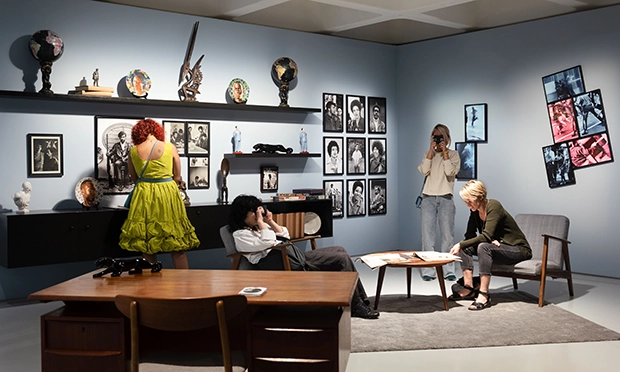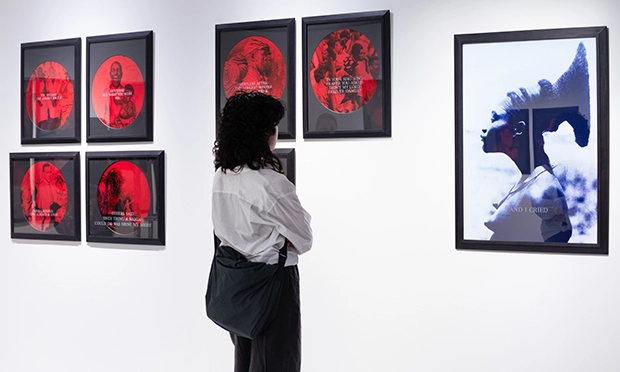Photographer Carrie Mae Weems shows how art can reclaim history with emotive Barbican exhibition

Visitors explore the exhibition at the Barbican gallery. Photograph: Jemima Yong
There is still time to catch the Barbican exhibition of acclaimed American photographer Carrie Mae Weems and its thought-provoking take on the Black American experience.
Reflections for Now is her biggest exhibition to date in the UK, a place where she is little known compared to her notoriety in America (for now).
It was a unique opportunity to see her perspective, told through a curation of her photography and film from the past 40 years.
The exhibition starts with abstract art: crass blocky shapes with high contrast black and orange with an ominous edge. They appear as expressionist decoration, but this is actually a conceptual piece.
We learn the pictures are cropped and edited photos of real scenes of shop fronts, where messy dark layers of paint were applied to obscure protesters’ messages in the wake of George Floyd’s murder.
Cleverly, they represent erasure of Black history in art, including, as Weems explains, Black American expressionist artists whose significance has been overlooked.
It is a promise of the interesting ways Weems will express this theme in the exhibition, and a unique way to bring past and present together.
The show handles politics, art and culture as ways Black Americans have been appropriated and misrepresented.
One famous personal collection is Weems’ candid shots black and white shots, which challenge two-dimensional depictions of Black American women throughout history.
These pictures are beautifully intimate, telling stories about desire, love, solidarity, anguish, gender and more through domestic life.

Photograph: Jemima Yong
One particular insight into life at home which moved me is about Weems and her young daughter. They sit adjacent at a table, absorbed and independently doing their make-up on separate adult and child table-top mirrors. Such a simple image has a humorous but powerful contrast: a mother carrying out a habitual womanhood ritual, and a daughter mimicking it and exploring the fun, without any of the pressures attached.
These photos are to humanise and to confront the way people have been dehumanised through art and culture.
Another display explores this dark past. Weems curates a set of photos of slaves which were taken and used without consent in order to further the racist theory of polygenism in 1850.
Weems repurposes the photos with edits like a red frame and lighting, arranged with poetic lines confronting us with a timeline of oppression and violence.
This poignant and immensely moving part is a perfect way to hold history accountable. It shows the opportunities of activism through reusing historical sources and art, and hope for setting records straight in this way.
The exhibition is bursting with other ideas and styles of photography, with surreal edges, or recreations of historical scenes that Weems feels needs exploring.
Seeing the evolution of her ideas and preoccupations has a monumental effect, and one can only imagine the impact on herself.
Running through the exhibition is also a current of Black resistance and activism, paying homage to them.
Weems puts together a display mirroring a 1960s meeting or living room with objects of political significance, like posters of Angela Davies, Black Panther memorabilia, LIFE magazine, offset with the racist board game Little Black Sambo.
There are also cinematic experiences. One film is a bittersweet depiction of the journey of American politics, shown to be farcical with clowns and eerie chaotic scenes.
In the face of frustrating, circus-like politics, thank goodness for art that shows this farce up for what it is.
Reflections for Now runs until 3 September at the Barbican.
